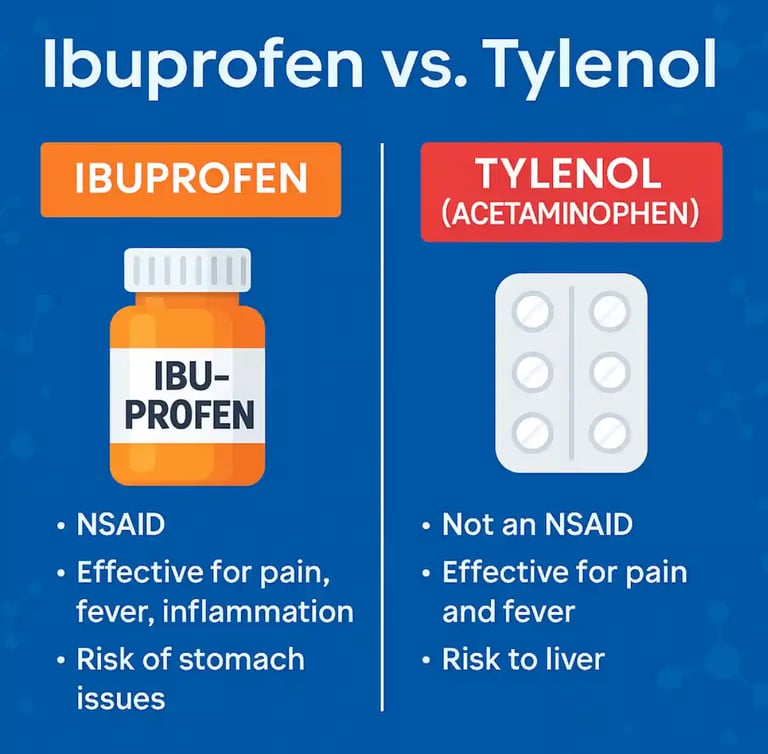Ibuprofen vs. Tylenol: Key Differences in Pain Relief, Safety, and Side Effects
Compare ibuprofen vs Tylenol in this detailed guide. Learn differences in pain relief, inflammation control, side effects, and safety to choose wisely.


Ibuprofen vs. Tylenol: Key Differences in Pain Relief, Safety, and Side Effects
Ibuprofen (Advil) and acetaminophen (Tylenol) are two of the most commonly used over-the-counter pain relievers, but they work in very different ways. Understanding how they compare can help you make safer, more informed choices based on your symptoms, health conditions, and how often you use them.
Ibuprofen is a nonsteroidal anti-inflammatory drug (NSAID), so it reduces pain, fever, and inflammation. Tylenol (acetaminophen) can also help with pain and is very effective for a fever but it does not reduce inflammation. That means ibuprofen is often more effective for conditions like muscle strains, joint pain, or arthritis, while Tylenol may be a safer option for a fever and for those with sensitive stomachs or certain health conditions.
Choosing between them depends on your situation. Some people may switch between the two but you should always check and only do so under medical advice. Each has its own risks, so understanding the differences can help you use them more safely.
FAQ
Which is better for headaches — ibuprofen or Tylenol?
Both work well for different types of headaches. Tylenol may be better for tension headaches, while ibuprofen often works better for migraines, or pain caused by inflammation.
Can I take both at the same time?
Yes, ibuprofen and Tylenol (acetaminophen) can be taken together safely because they work differently in the body. Some people take them at the same time for stronger relief, while others alternate them every 3–4 hours to extend pain control throughout the day. The key is to stay within the recommended daily limits for each drug: up to 3,000 mg of acetaminophen (less if you have liver concerns or drink alcohol) and up to 1,200 mg of ibuprofen without a prescription.
For ongoing pain, or if you’re unsure about the right timing, it’s best to talk with a healthcare professional to make sure this approach is safe for your situation.
Which is easier on the stomach?
Tylenol is generally easier on the stomach. Ibuprofen can irritate the stomach lining and may cause ulcers or bleeding if overused or taken on an empty stomach.
Which is safer for long-term use?
Neither should be taken daily on a long term basis without medical advice. Tylenol can harm the liver in high doses, while ibuprofen may raise the risk of heart, kidney, or stomach problems with long-term use.
Which one helps with inflammation?
Ibuprofen. Tylenol does not reduce swelling or inflammation. For more on Ibuprofen and inflammation, click here.
Can children take both?
Sometimes, yes — pediatricians may suggest alternating doses for fevers. But dosage and timing must be very precise. Always check with a healthcare provider before giving both and especially when its for children.
Disclaimer
This page summarizes information from trusted medical sources and is provided for general knowledge only. lt is not medical advice; Always consult your doctor or pharmacist for personal medical guidance (For a more comprehensive explanation please see the full disclaimer).
Resources
The information above has been gathered from several reputable sources, including the following:
[1] Mayo Clinic – Ibuprofen (Oral Route)
[2] Mayo Clinic – acetaminophen
[3] FDA – Ibuprofen Drug Safety Information


